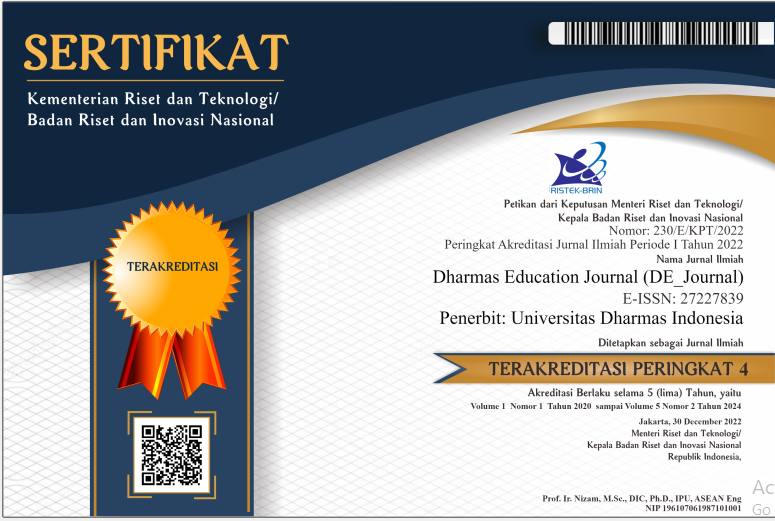AN ANALYSIS OF BRITISH AND AMERICAN ENGLISH PRONUNCIATION PREFERENCES AMONG INDONESIAN STUDENTS
DOI:
https://doi.org/10.56667/de_journal.v4i1.1063Abstract
This study investigates how phonological awareness and high-frequency vocabulary practice can support English language learning among university students. Recognizing that pronunciation and spelling variations between American English (AmE) and British English (BrE) often pose challenges for learners, this research integrates phonological training with exposure to 100 high-frequency words. Over five days, 30 English department students participated in structured learning sessions involving pronunciation drills using International Phonetic Alphabet (IPA) transcriptions, comparative analysis of spelling differences, and interactive discussions on phonological patterns. Pre- and post-tests were administered to measure improvements in pronunciation accuracy and spelling recognition. The findings reveal substantial gains in students’ pronunciation accuracy, increased awareness of English spelling variations, and enhanced confidence in oral and written communication. These results underscore the value of incorporating phonology-focused approaches in vocabulary learning, bridging the gap between theoretical knowledge of language systems and practical communicative competence.
Downloads
References
A. Sa’di, R. (2022). Stress Misassignment In The Pronunciation Of English By Arabic-Speaking Learners: Erratic Practice Or Crosslinguistic Influence? International Journal Of Arabic-English Studies, 22(1), 79–100. Https://Doi.Org/10.33806/Ijaes2000.22.1.5
Agustiana, W., Batau, S. H., & Rampeng. (2021). The Influence Of Using “Hello English” Application Towards Students’ Pronunciation Of The Eigth Grade At Smpn 1 Sumarorong. Klasikal : Journal Of Education, Language Teaching And Science, 3(1), 41–51.
Al-Jarf, R. (2022). Student-Interpreters’ Foreign Proper Noun Pronunciation Errors In English-Arabic And Arabic-English Media Discourse Interpreting. International Journal Of Translation And Interpretation Studies (Ijtis), 2(1), 80–90.
Al-Zoubi, S. (2022). The Speech Sounds Of Arabic Language And Their Effect On Learning English Pronunciation: A Contrastive Analysis. International Journal Of Humanities And Social Science, 9(1), 15–27.
Ambarwati, R., & Mandasari, B. (2020). The Influence Of Online Cambridge Dictionary Toward Students’ Pronunciation And Vocabulary Mastery. Journal Of English Language Teaching And Learning, 1(2), 50–55. Https://Doi.Org/10.33365/Jeltl.V1i2.605
Antaris, I., & Omolu, F. A. (2019). Factors Affecting Pronunciation Difficulties Of 8 Th Grade Students Of Mtsn Palu Barat. Journal Of Foreign Language And Educational Research, 2(2), 10–19.
Arafa, M. N. M., Elbarougy, R., Ewees, A. A., & Behery, G. M. (2018). A Dataset For Speech Recognition To Support Arabic Phoneme Pronunciation. International Journal Of Image, Graphics And Signal Processing, 10(4), 31.
Arjuni, D. (2022). The Implementation Of Direct Method Assisted By Google Translate Voice To Improve Students’ Pronunciation.
Asif, A., Mukhtar, H., Alqadheeb, F., Ahmad, H. F., & Alhumam, A. (2021). An Approach For Pronunciation Classification Of Classical Arabic Phonemes Using Deep Learning. Applied Sciences, 12(1), 238. Https://Doi.Org/10.3390/App12010238
Betty Marlina Sihombing, H., & Purba, D. (2022). Improving Students’ Pronunciation Mastery Through Learning By Using Medias (Englsih Songs And English Movies). Jurnal Darma Agung, Xxvi(1), 591–599.
Bond, M., Zawacki-Richter, O., & Nichols, M. (2019). Revisiting Five Decades Of Educational Technology Research: A Content And Authorship Analysis Of The British Journal Of Educational Technology. British Journal Of Educational Technology, 50(1), 12–63. Https://Doi.Org/10.1111/Bjet.12730
Budianto, A. (2019). A Comparative Study Of French, British, Dutch, And Russian External Supervisory Agencies Of Investigators And Prosecutors Within Integrated Criminal-Justice-System. Padjadjaran Jurnal Ilmu Hukum (Journal Of Law), 5(3), 527–542. Https://Doi.Org/10.22304/Pjih.V5n3.A7
Cahyasari, D. (2022). Jurnal British. Jurnal British, 2(2), 16–29.
Cerezo, R., Calderón, V., & Romero, C. (2023). A Holographic Mobile-Based Application For Practicing Pronunciation Of Basic English Vocabulary For Spanish Speaking Children. International Journal Of Human-Computer Studies, 124, 13–25. Https://Doi.Org/10.1016/J.Ijhcs.2018.11.009
Farrah, M., & Halahlah, N. (2020). Pronunciation Problems Among Palestinian English Major Students In Hebron University.
Gilakjani, A. P. (2022). A Study Of Factors Affecting Efl Learners ’ English Pronunciation Learning And The Strategies For Instruction. International Journal Of Humanities And Social Science, 3(2), 119–128.
Gilakjani Pourhosein Abbas. (2021). English Pronunciation Instruction: A Literature Review. International Journal Of Research In English Education, 1 No. 1(1), 1–6.
Jahara, S. F., & Abdelrady, A. H. (2021). Pronunciation Problems Encountered By Efl Learners: An Empirical Study. Arab World English Journal, 12(4), 194–212. Https://Awej.Org/
Jubier, M. M. (2019). English Consonant Pronunciation Difficulties Of Adult Efl Arab Learners In Malaysia. International Journal Of Language Academy, 7(2).
Mellisa, M., Apriliaswati, R., & Bunau, E. (2019). Improving Students’pronunciation In Speaking By Using Podcast As Media. Jurnal Pendidikan Dan ….
Pardede, P. (2021). Improving Efl Students’ English Pronunciation By Using The Explicit Teaching Approach. Journal Of English Teaching, 4(3), 143–155. Http://Ejournal.Uki.Ac.Id/Index.Php/Jet
Rehman, I., Silpachai, A., Levis, J., Zhao, G., & Gutierrez-Osuna, R. (2022). The English Pronunciation Of Arabic Speakers: A Data-Driven Approach To Segmental Error Identification. Language Teaching Research, 26(6), 1055–1081. Https://Doi.Org/10.1177/1362168820931888
Saadia, K. H. (2023). Assessing The Effectiveness Of Text-To-Speech And Automatic Speech Recognition In Improving Efl Learner’s Pronunciation Of Regular Past-Ed. Http://Archives.Univ-Biskra.Dz/Handle/123456789/27059
Downloads
Published
How to Cite
Issue
Section
License
Copyright (c) 2025 Dharmas Education Journal (DE_Journal)

This work is licensed under a Creative Commons Attribution-NonCommercial-NoDerivatives 4.0 International License.
Makalah yang disampaikan diasumsikan tidak mengandung bahan propietary yang tidak dilindungi oleh hak paten














